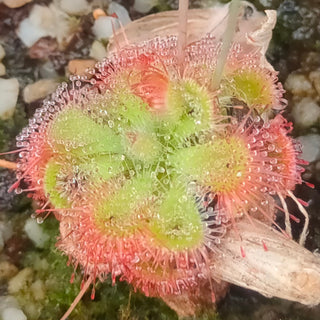Dionaea muscipula
VENUS FLYTRAP 'BRUTAL SHARK'
- Unit price
- / per
The traps of 'Brutal Shark' flytrap have double rows of sharp-looking shark teeth! The red and green coloration create a stunning and unique plant for your window!
The Venus flytrap (also referred to as Venus's flytrap or Venus' flytrap), Dionaea muscipula, is a carnivorous plant native to subtropical wetlands on the East Coast of the United States in North Carolina and South Carolina. It catches its prey-chiefly insects and arachnids-with a trapping structure triggered by tiny hairs on their inner surfaces. When an insect or spider crawling along the leaves contacts a hair, the trap prepares to close, snapping shut only if another contact occurs within approximately twenty seconds of the first strike. The requirement of redundant triggering in this mechanism serves as a safeguard against wasting energy by trapping objects with no nutritional value, and the plant will only begin digestion after five more stimuli to ensure it has caught a live bug worthy of consumption.
Speed of closing can vary depending on the amount of humidity, light, size of prey, and general growing conditions. The speed with which traps close can be used as an indicator of a plant's general health. Venus flytraps are not as humidity-dependent as are some other carnivorous plants.
Most carnivorous plants selectively feed on specific prey. This selection is due to the available prey and the type of trap used by the organism. With the Venus flytrap, prey is limited to beetles, spiders and other crawling arthropods. In fact, the Dionaea diet is 33% ants, 30% spiders, 10% beetles, and 10% grasshoppers, with fewer than 5% flying insects.
If the prey is unable to escape, it will continue to stimulate the inner surface of the lobes, and this causes a further growth response that forces the edges of the lobes together, eventually sealing the trap hermetically and forming a "stomach" in which digestion occurs
Digestion takes about ten days, after which the prey is reduced to a husk of chitin. The trap then reopens, and is ready for reuse.
Plants can be propagated by seed. The plants will live for 20 to 30 years if cultivated in the right conditions.
Height: 5-6 inches, 13-15cm
Hardiness zones: Often grown indoors. Outdoor hardy in zones 7-11, and hardy in zones 5 and 6 with adequate winter protection.
Seeds per packet: 5
Fill the container with a mix of peat and perlite at a 1:1 ratio. Place the seeds on the surface of the pre-dampened mix, and gently water with a spray bottle. Do not bury the seeds, as light helps germination. Cover with clear plastic, and place your container in a cool area (but not freezing) for 6 weeks. Once the cold period is completed, place the container at room temperature (20°C/71°F) and in bright light for them to germinate. Be sure to keep the soil moist during this entire germination period. Most seedlings will sprout within 2-3 months of the warming period, though some may take a little longer. Once plants sprout, slowly remove the plastic, a little bit each day. Always keep the soil slightly moist, never letting it dry out.
Dionaea muscipula
VENUS FLYTRAP 'BRUTAL SHARK'
- Unit price
- / per
Multiple secure payment options available.
Adding product to your cart
You may also like
The traps of 'Brutal Shark' flytrap have double rows of sharp-looking shark teeth! The red and green coloration create a stunning and unique plant for your window!
The Venus flytrap (also referred to as Venus's flytrap or Venus' flytrap), Dionaea muscipula, is a carnivorous plant native to subtropical wetlands on the East Coast of the United States in North Carolina and South Carolina. It catches its prey-chiefly insects and arachnids-with a trapping structure triggered by tiny hairs on their inner surfaces. When an insect or spider crawling along the leaves contacts a hair, the trap prepares to close, snapping shut only if another contact occurs within approximately twenty seconds of the first strike. The requirement of redundant triggering in this mechanism serves as a safeguard against wasting energy by trapping objects with no nutritional value, and the plant will only begin digestion after five more stimuli to ensure it has caught a live bug worthy of consumption.
Speed of closing can vary depending on the amount of humidity, light, size of prey, and general growing conditions. The speed with which traps close can be used as an indicator of a plant's general health. Venus flytraps are not as humidity-dependent as are some other carnivorous plants.
Most carnivorous plants selectively feed on specific prey. This selection is due to the available prey and the type of trap used by the organism. With the Venus flytrap, prey is limited to beetles, spiders and other crawling arthropods. In fact, the Dionaea diet is 33% ants, 30% spiders, 10% beetles, and 10% grasshoppers, with fewer than 5% flying insects.
If the prey is unable to escape, it will continue to stimulate the inner surface of the lobes, and this causes a further growth response that forces the edges of the lobes together, eventually sealing the trap hermetically and forming a "stomach" in which digestion occurs
Digestion takes about ten days, after which the prey is reduced to a husk of chitin. The trap then reopens, and is ready for reuse.
Plants can be propagated by seed. The plants will live for 20 to 30 years if cultivated in the right conditions.
Height: 5-6 inches, 13-15cm
Hardiness zones: Often grown indoors. Outdoor hardy in zones 7-11, and hardy in zones 5 and 6 with adequate winter protection.
Seeds per packet: 5
Fill the container with a mix of peat and perlite at a 1:1 ratio. Place the seeds on the surface of the pre-dampened mix, and gently water with a spray bottle. Do not bury the seeds, as light helps germination. Cover with clear plastic, and place your container in a cool area (but not freezing) for 6 weeks. Once the cold period is completed, place the container at room temperature (20°C/71°F) and in bright light for them to germinate. Be sure to keep the soil moist during this entire germination period. Most seedlings will sprout within 2-3 months of the warming period, though some may take a little longer. Once plants sprout, slowly remove the plastic, a little bit each day. Always keep the soil slightly moist, never letting it dry out.
















































